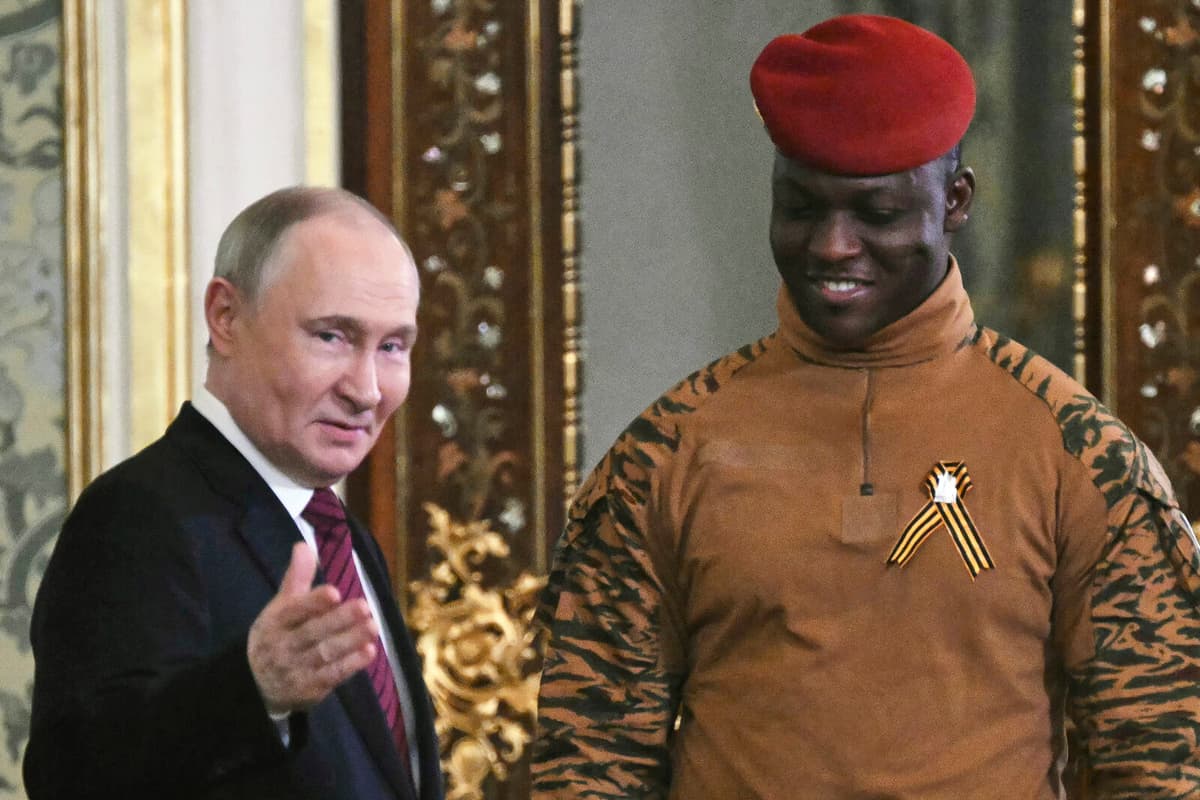When the Wagner group announced last week that it would leave Mali, the so-called African Corps stepped out and assured: Russia's presence there will remain.
Forces from the privately owned Wagner group on paper have been running Russian errands on the African continent for a long time. Since the tumultuous summer of 2023 - where the group's leader Yevgeny Prigozhin started a short-lived rebellion and later died in a mysterious plane crash - its missions have been taken over step by step by forces in official uniform.
"Who dares wins", is the motto of the African Corps. Its soldiers have already shown up in Burkina Faso and Niger, where they support the sitting juntas that are strengthening their official ties to Vladimir Putin's regime in Moscow.
From coast to coast
According to the corps' own information, about half of its soldiers have previously been part of the Wagner forces. According to Reuters, which refers to information from Russian mercenaries, it may be up to 80 percent.
The African Corps replaces Wagner in the countries of the "coup belt", a series of notoriously unstable countries that stretch from coast to coast through the southern Sahara.
In countries such as the Central African Republic, Mali, Niger, and Burkina Faso, military juntas that have taken power by force and then received Russian help to maintain it rule. In war-torn countries such as Libya and Sudan, Russian forces have thrown their weight behind one of the warring parties.
Wagner soldiers have been involved in trying to combat jihadist uprisings that have been simmering in the region for a long time, but they have suffered several setbacks on that front. They have also protected Russia's economic interests, often in the form of valuable mines, and have been accompanied by extensive propaganda machinery where Russia is portrayed as a more benevolent partner in the light of shortcomings from former colonial powers such as France.
The Russian soldiers, who in several countries have been referred to only as private military instructors, have also been followed by testimonies of extrajudicial executions, disappearances, and massacres.
Newly formed alliance
When it became clear that Wagner would be replaced by the African Corps in Mali, the Kremlin's spokesman Dmitry Peskov was asked what it means for Russia's presence in Africa. It will grow and cooperation will deepen, he replied.
This also has to do with, and extends to, such sensitive areas as defense and security, said Peskov.
Burkina Faso, Mali, and Niger left the West African community Ecowas earlier this year, which they described as a major threat. They are instead focusing on their own alliance or confederation, where they have issued common passports and intend to form a common military force. They received formal support from Russia at a meeting in Moscow in April.
Russia is not just our partner, but also a permanent ally that we can rely on, said Mali's Foreign Minister Abdoulaye Diop at a press conference with his colleagues, according to Russian state media.
Advertisement
Vladimir Putin has shaken hands on military cooperation with leaders in, among others, Equatorial Guinea, Guinea, and Guinea-Bissau in recent times.
Russia's interest is believed to be directed towards Chad in the future, a large neighboring country to several of the Russian-allied Sahel states. Cameroon and Togo are also mentioned as potential interests in a quest for access to the Atlantic coast.
Blinking: We are here
When anonymous Russian-speaking soldiers without insignia appeared on the Ukrainian Crimean peninsula in 2014 in one of Russia's early noted hybrid operations, President Putin came out and denied outright that any Russian soldiers were in the area.
The phrase "They are not there" became over time a satirical concept in itself, a Russian neologism, which came to be used about the Kremlin's continued attempts to conceal its interventions in conflicts around the world.
The Wagner group eventually stepped out into the public eye. Now it, and a number of other newly formed mercenary groups, are under the Russian military. When the African Corps announced its first missions in Africa via social media last year, it gave an unequivocal message: "We. Are. There."
.
The Wagner group was a private mercenary company that long acted with unofficial ties to the Russian leadership.
Its highest leader and main financier was Yevgeny Prigozhin, an oligarch and former restaurateur from St. Petersburg, who with his ties to Vladimir Putin acted in the Kremlin's interests in various ways and built his own business empire.
During the Ukraine war, Prigozhin came into conflict with Russia's military leadership, where he accused the then Defense Minister and Chief of Staff of major failures when thousands of Wagner soldiers were killed at the front.
The power struggle ended with Prigozhin in June 2023 turning around and starting an armed rebellion on Russian soil with 25,000 soldiers. During a "march of justice" towards Moscow, they took control of cities and got into deadly clashes with army forces, before it was suddenly interrupted.
An agreement was said to have been reached, which would surprisingly give Wagner a free pass. A few weeks later, Prigozhin and several other leading figures died in a plane crash on their way from Moscow.
The Wagner group (Grupa Vagnera) got its name from its first front figure Dmitry Utkin. He used "Wagner" as a call sign in battle, as his "nom de guerre".
The inspiration for this came from Nazi Germany, with reference to Adolf Hitler's favorite composer Wagner. The group has often used references to this, when they jokingly referred to their forces as an "orchestra" and weapons were stored in instrument cases.
How the Russian African Corps got its name is still unclear, but it has an established historical namesake. Nazi Germany's motorized units in the desert battles in North Africa during World War II, led by General Erwin Rommel, were also called the African Corps. The names are the same even in Russian (Afrikanskij korpus).






